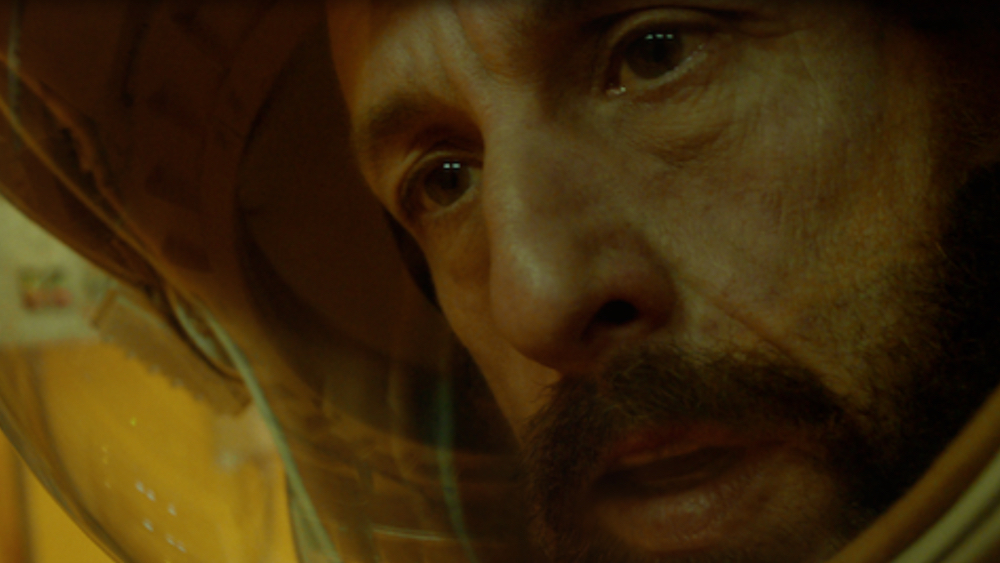Netflix. 2024. Science Fiction. 107min.
Grade: 2 out of 4
Adam Sandler is hardly the first comic to make the turn into motion picture drama but the former Saturday Night Live cast member has definitely had one of the longer roads to travel. And it’s not even a journey he’s been totally committed to. After an early score in Paul Thomas Anderson’s 2002 oddball character piece, Punch-Drunk Love, the erstwhile Opera Man has mostly filled his dance card with cute if juvenile comedies and Netflix garbage while attempting the occasional dramatic work. But even at his best, like in 2019’s high wire act, Uncut Gems, Sandler’s reading of anxiety-ridden jewelry dealer Howard Ratner isn’t far removed from his comedic characters whose vein-popping howls of rage garnered laughs in much of his earlier work. In Spaceman, director Johan Renck’s admirable but undercooked marriage story nestled inside a sci-fi mind trip, Sandler strays too far out of his lane and while he may be the primary reason the film got made, he’s also the primary reason the film doesn’t entirely work.
Spaceman also doesn’t entirely work because screenwriter Colby Day, adapting Jaroslav Kalfař’s 2017 novel Spaceman in Bohemia, fails to mine the source material for anything unique to say about human behavior while promising bits of character background, world building, and nods to the fall of Czechoslovakian Communism are introduced but remain curiously unexplored. All this suggests that Day struggled to find a place for all the best parts of Kalfař’s presumably richly layered novel, leaving us with a hobbled script that mistakes abstraction for psychological inquiry and a final product that’s absorbing and technically accomplished but not as probing as its somber mood would have you believe.
The very short list of existential sci-fi movies about an astronaut in grief-stricken emotional crisis over his absent wife begins (and ends) with Andrei Tarkovsky’s 1972 mind bender Solaris. Spaceman director Johan Renck (2019’s outstanding miniseries Chernobyl) certainly knows this so he plays his trump card early, namely the giant, six-eyed hairy spider who suddenly appears aboard the one-man Czechoslovakian spacecraft traveling towards Jupiter to investigate a mysterious mass of particles that materialized four years previous. Sandler plays the lone astronaut, a Czech national named Jakub who’s weighed down so heavily with despair that it’s a miracle his ship was able to take off. His silent anguish stems from his teetering marriage to Lenka (Carey Mulligan, giving more than she was given). Back on Earth she’s pregnant with their first child but Jakub selfishly agreed to the year-long mission to bring back particles of the mysterious mass named the Chopra Cloud. So with Jakub floating through the solar system in a depressive stupor she sends him a video message announcing she wants a separation. But the message is intercepted by Czech space honcho Commissioner Tuma (Isabella Rossellini), who fears if he receives her Dear Jakub transmission he’ll be too inconsolable to complete the mission. All this tees up key behavioral insights into Jakub that are slowly uncovered by his arachnid companion.
Whether the creature, christened Hanuš by Jakub and soothingly voiced by Paul Dano as if HAL 9000 was a hippie-era personal therapist, is really a benign and curious alien from the beginning of time or a manifestation of Jakub’s subconscious is beside the point. Its purpose, other than to acquire a love for hazelnut spread, is to show Jakub the errors of his emotional ways. These breakthroughs, which force Jakub to bring his repressed feelings to conscious awareness, often involve Hanuš articulating his conclusions instead of letting the audience figure it out themselves. “You long for your mate only once she leaves. Where was this yearning when you were together?” Hanuš says bringing us to the crux of the issue and presenting Jakub as a man who’d rather to travel to the farthest reaches of our solar system in utter loneliness than look into his wife’s eyes and accept her love.
What seduces us into thinking that Spaceman is a probing dissection of the distant, solipsistic center of a failing marriage is its expertly modulated and sustained mood and below the line craftsmanship. Renck and cinematographer Jacob Ihre find ways to slink up, around, and upside-down Jakub’s small spacecraft allowing us to acknowledge his emotional and physical claustrophobia and dislocation without burdening us with the same feeling. The ship, created by production designer Jan Houllevigue, is an engagingly detailed Space Race-era bucket of tubes, doors, and mundane colors, as well as snacks that occasionally escape their shelved confines. The clanky sound design, which includes the malfunctioning toilet that terrorizes Jakub’s sleep (although Hanuš finds the vibration rather soothing) adds greatly to our ability to sink into the film, as does Max Richter’s dissonant, hardworking score.
In the end, it all comes down to Sandler. He commands the screen but despite our goodwill and desire to credit him for even attempting this role, he can’t convey enough interior life to make a soft-spoken and despondent character cut off from his emotions resonate to any great degree. Watching the film, one dreams of a version where Sandler and Mulligan swap roles. Although the story doesn’t support that (anyone want to see a pregnant Adam Sandler?), the thrice Oscar nominated Mulligan, who spends much of Spaceman staring into the middle distance as her marriage dissolves, conveys more inner turmoil and silent suffering in one wordless shot than Sandler has in his entire career. This is especially impressive since her one-note character exists solely to service Jabuk’s psychological journey, one delivered with a heavy hand, a somber tone, and a message no weightier than what you’d find in an airport romance novel.

